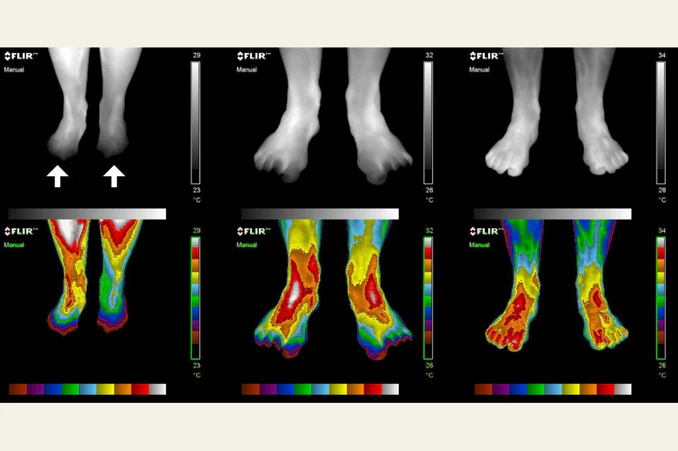In today’s fast-paced world, poor sleep quality is a common issue affecting millions of people. Whether it’s due to stress,...

In today’s fast-paced world, poor sleep quality is a common issue affecting millions of people. Whether it’s due to stress, inflammation, or other lifestyle factors, achieving restful sleep can seem like an uphill battle. One natural method that has garnered attention in recent years is grounding, or earthing. Grounding involves making direct physical contact with the Earth, either by walking barefoot on natural surfaces or using specially designed products like grounding mats and bedsheets. But how exactly does grounding improve sleep quality, and is there scientific evidence to support it? Let’s explore the research and the potential benefits grounding can bring to your nightly rest.
Grounding is based on the principle that the Earth’s surface carries a mild negative electric charge, thanks to an abundance of electrons. When the human body connects with the Earth—whether by walking barefoot on grass, sand, or soil, or by using grounding products—the body absorbs these electrons. This interaction is believed to have profound physiological effects, including a reduction in inflammation, stress, and improved sleep patterns.
While grounding may seem unconventional to some, it has deep roots in the natural world. Our ancestors were in constant contact with the Earth, and it’s only in modern times that we’ve insulated ourselves from this connection through rubber-soled shoes and living in elevated structures. Grounding aims to restore that lost connection and, in doing so, help improve various aspects of health, including sleep.
Several studies have examined the impact of grounding on human health, particularly in relation to sleep. One of the most notable studies is by Gaétan Chevalier, Ph.D., who conducted a study in 2012 on the effects of grounding on sleep and stress. In this study, participants slept grounded (using grounding sheets) for eight weeks.
The results showed significant improvements in sleep, including a reduction in the time it took participants to fall asleep and an increase in overall sleep duration.
Furthermore, participants reported feeling more rested upon waking, suggesting that grounding may also enhance sleep quality .
Grounding has also been shown to positively influence cortisol levels in the body. Cortisol is a stress hormone that follows a daily cycle, with levels peaking in the morning and gradually tapering off by night. However, chronic stress and inflammation can disrupt this cycle, leading to sleep disorders like insomnia. Research published in the Journal of Inflammation Research demonstrated that grounding helps normalize cortisol secretion, aligning it more closely with the body’s natural circadian rhythms. This regulation is key to promoting deeper, more restful sleep .
Additionally, grounding has been found to reduce inflammation—a key contributor to sleep disturbances. According to a review published in the Journal of Environmental and Public Health, inflammation is often linked to poor sleep quality and conditions like sleep apnea.
Grounding neutralizes free radicals in the body, which are responsible for oxidative stress and inflammation. By reducing inflammation, grounding helps the body enter a more relaxed state, which is conducive to falling asleep and staying asleep throughout the night.

The mechanism through which grounding improves sleep primarily revolves around the body’s electrical balance. When we disconnect from the Earth by wearing shoes and living indoors, we accumulate positive electrical charges, mainly in the form of free radicals. These free radicals can contribute to inflammation and disrupt normal bodily functions, including sleep regulation. Grounding allows the body to absorb electrons from the Earth, neutralizing free radicals and restoring the body’s natural electrical state.
Furthermore, grounding has been found to improve heart rate variability (HRV), a marker of autonomic nervous system function. Higher HRV is associated with better stress resilience and relaxation, both of which are essential for quality sleep. By improving HRV, grounding helps calm the nervous system, reducing nighttime awakenings and promoting deeper, more restorative sleep.
Incorporating grounding into your daily life is easier than you might think. You don’t need to spend hours outdoors barefoot to reap the benefits—although that’s certainly one option. Here are some simple ways to start grounding for better sleep:
Grounding offers a natural, science-backed way to improve sleep quality by addressing key factors like stress, inflammation, and cortisol regulation. For many people, poor sleep is caused by chronic stress and high levels of inflammation, both of which can be alleviated by grounding. By restoring the body’s electrical balance and reducing free radicals, grounding helps create a state of calm that is essential for restful sleep.
For those who struggle with insomnia or disrupted sleep patterns, grounding can serve as a complementary practice to traditional sleep hygiene methods. By incorporating grounding into your nightly routine, whether through grounding mats, bedsheets, or simply walking barefoot, you can enhance your ability to fall asleep faster, stay asleep longer, and wake up feeling more refreshed.
Many people who have incorporated grounding into their lives report noticeable improvements in their sleep quality. One testimonial from a participant in Chevalier’s study shared that after just a few weeks of grounding, they were able to sleep through the night without waking up multiple times—a feat they hadn’t achieved in years. Others have reported faster sleep onset, deeper sleep, and improved energy levels upon waking.
Grounding offers a simple yet powerful way to enhance sleep quality by addressing the root causes of poor sleep—stress, inflammation, and disrupted cortisol levels. Backed by scientific research, grounding products like mats and bedsheets can help restore your body’s natural rhythms and create an optimal environment for restful sleep. If you’re looking for a natural solution to improve your sleep, grounding may be the answer you’ve been searching for.
By incorporating grounding into your daily routine, you not only reconnect with the Earth but also unlock the potential for better sleep, improved health, and a greater sense of well-being.
